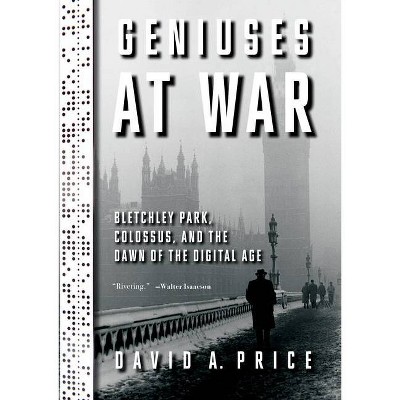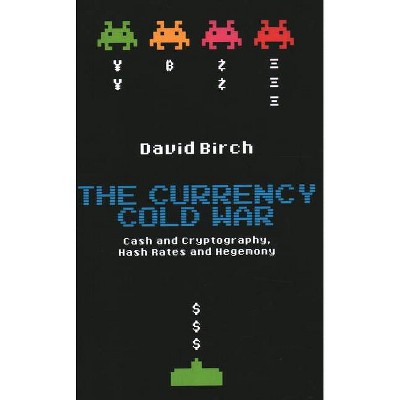Geniuses at War - by David a Price (Hardcover)

Similar Products
Products of same category from the store
AllProduct info
<p/><br></br><p><b> About the Book </b></p></br></br>"Geniuses at War is the dramatic, untold story of the brilliant team who built the world's first digital electronic computer at Bletchley Park, during a critical time in World War II. Decoding the communication of the Nazi high command was imperative for the success of the Allied invasion of Normandy. The Nazi missives were encrypted by the "Tunny" cipher, a code that was orders of magnitude more difficult to crack than the infamous Enigma code. But Tommy Flowers, a maverick English working-class engineer, devised the ingenious, daring, and controversial plan to build a machine that could think at breathtaking speed and break the code in nearly real time. Together with the pioneering mathematician Max Newman and Enigma code-breaker Alan Turing, Flowers and his team produced--against the odds, the clock, and a resistant leadership--Colossus, the world's first digital electronic computer, the machine that would help bring the war to an end. With fascinating detail and illuminating insight, David A. Price's Geniuses at War tells, for the first time, the mesmerizing story of the great minds behind Colossus, and chronicles their remarkable feats of engineering genius which ushered in the dawn of the digital age"--<p/><br></br><p><b> Book Synopsis </b></p></br></br><b><b>The dramatic, untold story of the brilliant team whose feats of innovation and engineering created the world's first digital electronic computer--decrypting the Nazis' toughest code, helping bring an end to WWII, and ushering in the information age.</b></b> <p/>Planning the invasion of Normandy, the Allies knew that decoding the communications of the Nazi high command was imperative for its success. But standing in their way was an encryption machine they called Tunny (British English for "tuna"), which was vastly more difficult to crack than the infamous Enigma cipher.<br/> <br/>To surmount this seemingly impossible challenge, Alan Turing, the Enigma codebreaker, brought in a maverick English working-class engineer named Tommy Flowers who devised the ingenious, daring, and controversial plan to build a machine that would calculate at breathtaking speed and break the code in nearly real time. Together with the pioneering mathematician Max Newman, Flowers and his team produced--against the odds, the clock, and a resistant leadership--Colossus, the world's first digital electronic computer, the machine that would help bring the war to an end.<br/> <br/>Drawing upon recently declassified sources, David A. Price's <i>Geniuses at War</i> tells, for the first time, the full mesmerizing story of the great minds behind Colossus and chronicles the remarkable feats of engineering genius that marked the dawn of the digital age.<p/><br></br><p><b> Review Quotes </b></p></br></br><br>A remarkable book. Highly accessible, with many historical details formerly unknown to me. The book is empathetic and engaging with a three-dimensional and rich texture. I felt as if I were there. What was accomplished, especially with Colossus, is nothing short of amazing. Reading excerpts from correspondence about predictions for artificial intelligence and networks was astonishing for its accuracy looking back nearly 75 years. Price deserves great praise for a historical gem. --Vint Cerf, father of the Internet <p/>"David Price has produced the riveting story of how a team of colorful geniuses in Bletchley Park, England broke the most secure German World War II codes. The tale of Alan Turing and the Enigma machine is well known, but Price describes the very secret code-breaking project that Turing and his colleagues tackled later in the war, which involved building the world's first electronic computer. Thus was the digital age born." --Walter Isaacson, author of <i>The Innovators <p/></i>"World War II opened two legendary gateways to the modern age: Los Alamos and Bletchley Park. A declassified report on the construction of the atomic bomb was released just six days after Hiroshima, while the Official Secrets Act lingered for thirty years over the codebreaking at Bletchley Park. David Price has distilled the available knowledge into an authoritative yet fast-paced account, lending the characters behind Colossus a voice that was silenced for far too long." --George Dyson, author of <i>Turing's Cathedral</i> <p/>A methodical account of the secret British code-breakers working to decode Adolf Hitler's wartime communications. . . . Gripping. . . . A narrative worthy of James Bond. --<i>Foreign Policy</i> <p/>[Price] weaves a superb narrative, at once compelling and relatable. . . . Incredibly well-written and well-researched, this fast-paced book reads like a novel. Highly recommended to readers with an interest in World War II and 20th-century history, as well as anyone looking for an exciting story of code breaking and intrigue." --<i>Library Journal</i> (starred) <p/>"Fresh. . . . Page-turning. . . . Price delivers a fascinating account of the problems Flowers and his team overcame before the massive machine called Colossus arrived. . . . He tells a terrific story. An entertaining history of brilliant minds at work against the Nazi behemoth." --<i>Kirkus Reviews</i> (starred) <p/>"An entertaining introduction to Bletchley Park and the era's technological innovations." --<i>Publishers Weekly</i><br><p/><br></br><p><b> About the Author </b></p></br></br>DAVID A. PRICE was educated at the College of William and Mary, Harvard University, and the University of Cambridge. He is the author of <i>The Pixar Touch</i> and <i>Love and Hate in Jamestown</i>. Price lives with his wife in Richmond, Virginia.
Price History
Cheapest price in the interval: 20.49 on November 8, 2021
Most expensive price in the interval: 20.49 on December 20, 2021
Price Archive shows prices from various stores, lets you see history and find the cheapest. There is no actual sale on the website. For all support, inquiry and suggestion messagescommunication@pricearchive.us




















